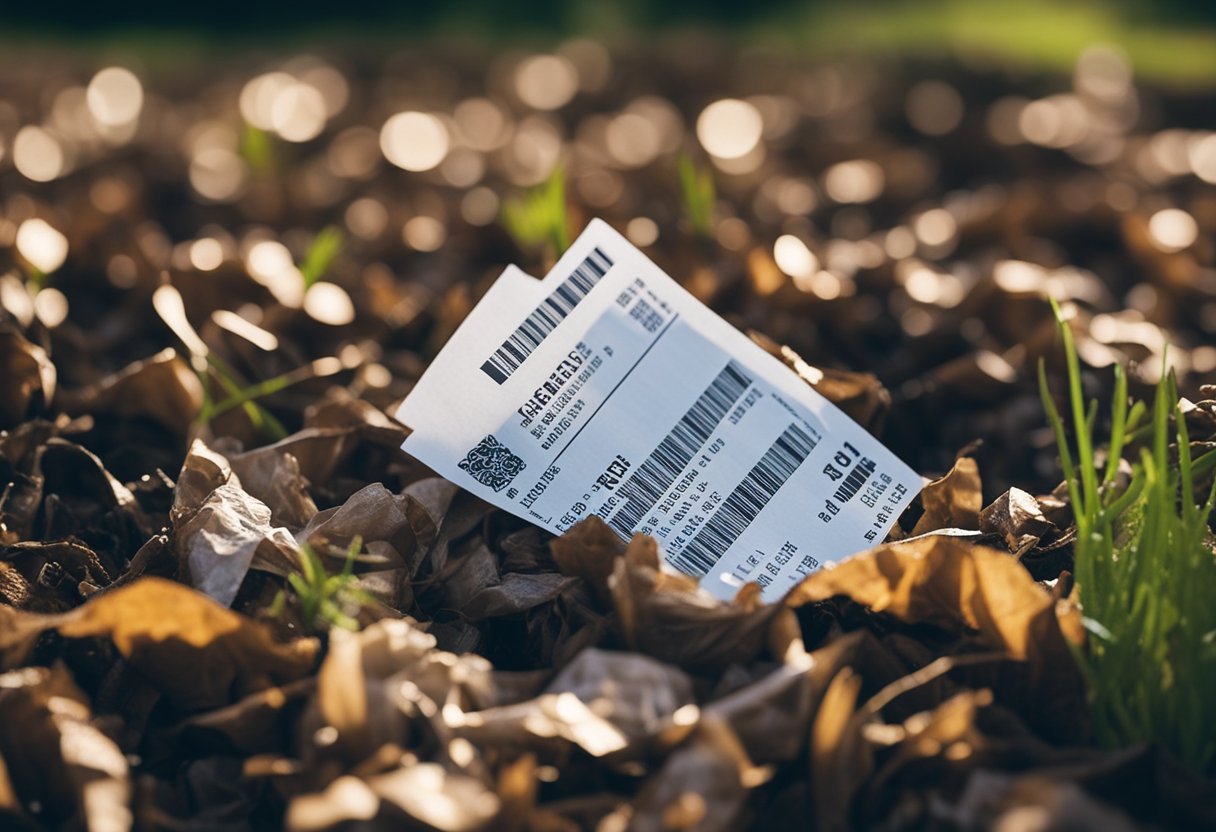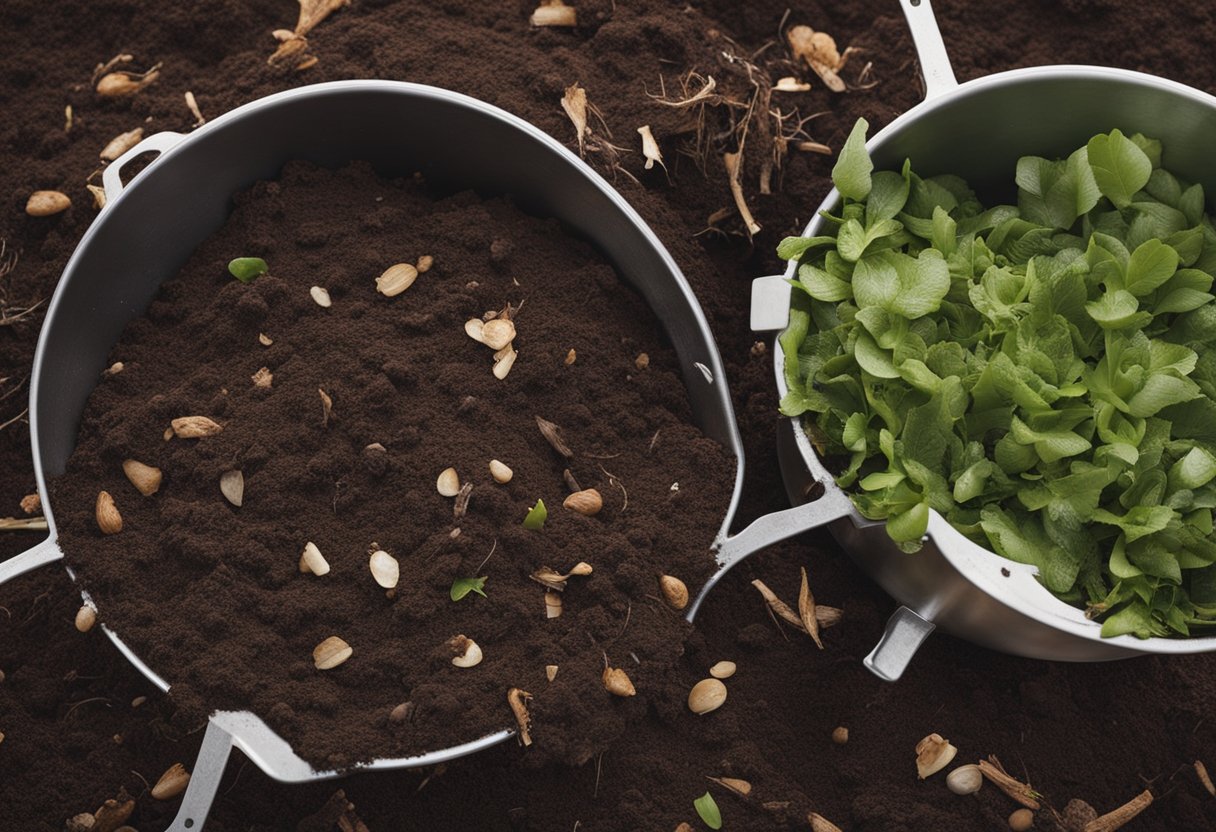As an Amazon Associate I earn from qualifying purchases.
At A Glance
Composting receipts is not recommended as many receipts are printed on thermal paper, which is coated with chemicals like bisphenol A (BPA) or bisphenol S (BPS). These chemicals can be harmful to both humans and the environment. When composted, the chemicals from thermal paper can leach into the compost, contaminating the soil and plants where the compost is later used. If you are unsure whether a receipt is printed on thermal paper, a simple way to check is by scratching the paper; if it leaves a dark mark, it’s likely thermal paper. It’s always better to err on the side of caution and avoid composting receipts.
Composting is a great way to reduce waste and create nutrient-rich soil for your garden. However, not all materials can be composted. One common item that people are unsure about is receipts. Can you compost receipts? The answer is not straightforward.

Receipts are typically made from thermal paper, which is coated in chemicals like bisphenol A (BPA) and bisphenol S (BPS). These chemicals can be harmful to the environment and human health, so it’s important to dispose of receipts properly. While some sources suggest that receipts can be composted, others advise against it due to the potential for chemical contamination. So, what’s the verdict?
Understanding Receipts
As we go about our daily lives, we often receive receipts for purchases made. Receipts are a type of paper that contains information about the transaction, such as the date, time, and amount spent. While they may seem harmless, receipts are often made of thermal paper, which contains chemicals that can be harmful to both the environment and human health.
Ink and Thermal Paper
Thermal paper is a type of paper that is commonly used for printing receipts. It is coated with a chemical that reacts to heat, producing the text or image on the paper. The ink used to print on thermal paper is also different from the ink used for regular paper. While regular ink is made of pigments or dyes, thermal ink is made of a mixture of dyes and chemicals that react to heat.
BPA and BPS in Receipts
One of the chemicals that are commonly found in thermal paper is bisphenol A (BPA). BPA is a known endocrine disruptor that can affect the hormonal balance in the body. It has been linked to a variety of health problems, including reproductive issues, heart disease, and cancer. In recent years, many manufacturers have started using bisphenol S (BPS) instead of BPA, but BPS has been found to have similar health effects.
It is important to note that not all receipts are made of thermal paper. Some receipts are printed on regular paper and do not contain BPA or BPS. However, it can be difficult to tell the difference between the two types of paper, so it is best to assume that all receipts are made of thermal paper unless stated otherwise.
In conclusion, receipts are often made of thermal paper, which contains chemicals that can be harmful to human health and the environment. It is important to be aware of the potential risks associated with handling receipts and to take steps to minimize exposure whenever possible.
Composting Process

As someone who composts regularly, I know that creating good compost requires a balance of carbon and nitrogen-rich materials. One of the main sources of carbon in a compost bin is paper materials, such as cardboard and paper napkins. However, not all paper materials are suitable for composting, and this includes receipts.
Balance of Compost Bin
To achieve a balanced compost bin, it is important to have a mix of carbon-rich materials, like paper, and nitrogen-rich materials, such as food scraps and grass clippings. The ideal ratio is 30:1 carbon to nitrogen. Receipts are not a good source of carbon for composting because they are coated with chemicals that can be harmful to the environment and human health, such as bisphenol A (BPA) or bisphenol S (BPS).
Inclusion of Paper Materials
While paper materials can be a good source of carbon, it is important to use the right kind of paper. Recycled paper is a better option than virgin paper because it is less harmful to the environment. Cardboard and paper napkins are also good choices for composting because they are made from unbleached paper and do not contain any harmful chemicals.
In addition to the balance of carbon and nitrogen, it is important to maintain the right moisture level in a compost bin. Too much moisture can lead to anaerobic conditions, which can slow down the composting process and produce unpleasant odors. Paper materials can help absorb excess moisture and maintain the proper balance.
In conclusion, receipts are not suitable for composting due to the chemicals they contain. However, other paper materials, such as cardboard and paper napkins, can be used to provide carbon in a compost bin. By maintaining the right balance of carbon and nitrogen and keeping the moisture level in check, you can create high-quality compost that will enrich your soil and help your plants thrive.
Potential Dangers of Composting Receipts
Toxicity and Health Risks
Composting receipts may seem like a sustainable solution to paper waste, but it can actually pose potential dangers to both human health and the environment. Receipts are often printed on thermal paper, which contains chemicals such as bisphenol A (BPA) and bisphenol S (BPS). These chemicals are known to be toxic and can cause a range of health problems, including cancer, hormonal disorders, diabetes, and obesity. When composting receipts that contain these harmful chemicals, they can leach into the soil and contaminate it, posing a risk to human health and the environment.
Environmental Impact
In addition to the potential health risks, composting receipts can also have a negative impact on the environment. Most receipts are not recyclable or compostable, so they end up in landfills. When receipts break down in landfills, they release harmful chemicals into the soil and water, contributing to environmental pollution. Furthermore, receipts printed on thermal paper can contaminate the recycling stream when mixed with other paper products, making it difficult to recycle other paper materials.
In conclusion, composting receipts may seem like a sustainable solution to paper waste, but it can actually pose potential dangers to both human health and the environment. It is important to properly dispose of receipts by recycling or throwing them in the trash, rather than composting them. Opting for digital receipt options and keeping a small notebook or phone app can reduce paper waste and eliminate the need to compost receipts.
Alternatives for Receipt Disposal
As we have seen, composting receipts is not a viable option due to the chemicals and toxins present in the paper. However, there are several alternatives for disposing of receipts that are more environmentally friendly.
Recycling Receipts
Recycling is a great way to dispose of receipts. However, not all receipts are recyclable. Thermal paper receipts, for example, cannot be recycled due to the chemicals used to print them. It is important to check with your local recycling facility to see if they accept receipts and what types of receipts they accept.
Digital Receipts
Digital receipts are becoming increasingly popular and are a great alternative to physical receipts. Many stores and businesses now offer the option to receive digital receipts via email or text message. This not only saves paper but also makes it easier to keep track of receipts.
Eco-friendly Receipts
There are now several options for eco-friendly receipts. Some stores and businesses have started using receipts made from recycled paper or paper that is free from harmful chemicals. These receipts are a great option for those who still prefer physical receipts.
Burning Receipts
Burning receipts is not the most environmentally friendly option, but it is an option nonetheless. If you have a fireplace or fire pit, burning receipts can be a way to dispose of them. However, it is important to note that burning receipts can release harmful chemicals into the air.
In conclusion, there are several alternatives to composting receipts that are more environmentally friendly. Recycling, digital receipts, and eco-friendly receipts are all great options. Burning receipts is also an option, but it should be done with caution.
Conclusion
In conclusion, composting receipts is not recommended due to the presence of harmful chemicals like bisphenol A (BPA) on thermal paper receipts. These chemicals can contaminate the compost and have a negative impact on plants, animals, and humans who consume them. Therefore, it is important to dispose of receipts properly by either recycling them or throwing them in the trash.
If you are looking for alternatives to composting receipts, you can consider reducing waste by opting for electronic receipts or asking for receipts only when necessary. This can significantly reduce the amount of paper waste generated and minimize the need for composting or disposal.
Overall, composting is a great way to deal with organic waste and reduce the amount of waste sent to landfills. However, it is important to be mindful of what can and cannot be composted to ensure that the final product is safe and healthy for the environment.
